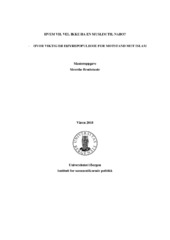Hvem vil vel ikke ha en muslim til nabo? Hvor viktig er høyrepopulisme for motstand mot islam
Master thesis
Permanent lenke
https://hdl.handle.net/1956/18358Utgivelsesdato
2018-07-03Metadata
Vis full innførselSamlinger
Sammendrag
Forskningsspørsmålet i denne oppgaven er å finne ut hvor viktig høyrepopulisme er for motstand mot islam. Dette er interessant fordi høyrepopulistiske partier har hatt økende oppslutning de siste 20 til 30 år. Denne økningen skjedde samtidig med økende innvandring til vesteuropeiske velferdsstater. Flyktningstrømmer fra land med islamsk religion har generert en ny politisk innvandringskritisk agenda. Kulturell trussel og trussel mot nasjonal identitet blir utfordret i møtet med nasjonens økende multikulturalitet. Fremmedfrykt og nasjonal identitet er derfor indikatorer som kan måle motstand mot islam. Det teoretiske fundamentet bygger på oppstandelsen av nasjoner og utviklingen av nasjonalstater, til politiseringen av nasjonalistiske ideologier som et forsvar mot flerkulturaliseringen. Det er benyttet kvantitativ metode for å analysere forskningsspørsmålet. Datagrunnlaget er hentet fra en omfattende europeisk spørreundersøkelse utført i 2014. Derfra er det tatt ut data fra noen utvalgte vesteuropeiske land som er kjennetegnet ved et moderne konsolidert demokrati. Dataanalyse fant at fremmedfrykt har sterk sammenheng med motstand mot islam. Nasjonal identitet viser også sammenheng. Resultat viser at populasjonen i landene utenfor Skandinavia er mest tilbøyelig til ikke ønske å ha muslimer til nabo. Funn fra undersøkelsen viste at stemmegivning til det høyrepopulistiske partiet i landet i utvalget, ikke hadde overbevisende sammenheng med det å være muslimkritisk. Dette var noe overraskende i forhold til antagelsen i problemstillingen. Konklusjonen på forskningsspørsmålet er at høyrepopulisme ikke er veldig viktig for motstand mot islam. Det er følelsen av fremmedfrykt og frykt for tap av nasjonal identitet som kan best forklare denne motstanden, uavhengig av politisk partitilhørighet. The research question in this theses is to find out how important right-wing populism is for resistance to Islam. This is interesting because right-wing populist parties have had increased support over the last 20 to 30 years. This increase occurred at the time of increasing immigration to Western European welfare states. Refugee flows from predominantly Muslim countries have generated a new political immigration critical agenda. Cultural threats and threats to national identity are challenged in the face of the nation's growing multiculturalism. Xenophobia and national identity are therefore indicators that can measure resistance to Islam. The theoretical foundation is based on the resurgence of nations and the development of national states, for the politicization of nationalist ideologies as a defense against multiculturalism. Quantitative method has been used to analyze the research question. The data are derived from a comprehensive European survey conducted in 2014. From there, data from some selected Western European countries have been extracted, which is characterized by a modern consolidated democracy. Data analysis found that xenophobia has a strong connection with resistance to Islam. National identity is also connected. Results show that the population in the countries outside of Scandinavia is most inclined to not want to have Muslims as neighbors. Findings from the investigation showed that voting for the right-wing populist party in each country studied, did not have convincing association with being Muslim-critical. This was somewhat surprising in relation to the assumption in the question. The conclusion of the research question is that right-wing populism is not very important for resistance to Islam. It is the feeling of xenophobia and fear of loss of national identity that best explains this resistance, regardless of political party affiliation.
